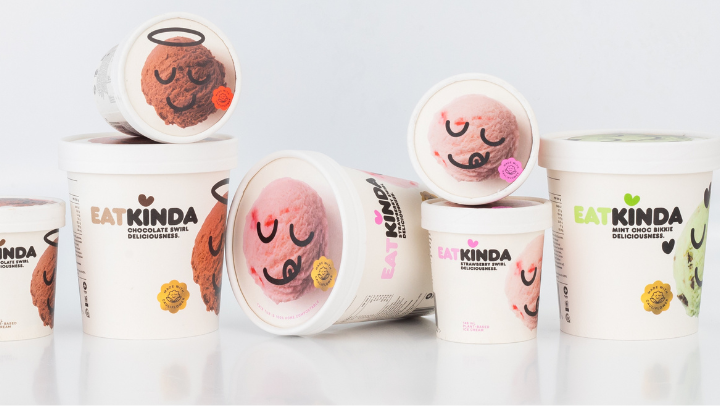I scream, you scream, we all scream for…cauliflower?
Students from SDSU’s Fowler College of Business are helping a Kiwi company introduce an offbeat ice cream product to the U.S. market.

Ice cream-craving vegans know all about brands using soy milk or even cashews as substitutes for dairy products, but with some marketing savvy from students at San Diego State University, a New Zealand company’s cauliflower-based treat is poised to enter the U.S. market.
That’s right, cauliflower: The vegetable from the mustard family that looks like broccoli and tastes like it needs a dip.
In an undertaking that began as a class project in a master’s-level global business development class, four students helped create the American product-launch strategy for the allergen-free, cauliflower ice cream developed by women-owned EatKinda that comes in chocolate swirl, strawberry swirl and mint chocolate bikkie (cookie to us Americans) flavors.
The company, which hopes to have its product in California stores by the end of the year, credits the SDSU students with helping to confirm that there’s a market for cauliflower ice cream in the U.S. and what to focus upon to sell it (taste, not lifestyle).
It all started in fall 2023 when EatKinda founders Milli Kumar and Jenni Matheson connected with management professor Martina Musteen, advisor in the Master of Science in Global Business Development (MSGBD) program. Musteen used their query as a project for her International Entrepreneurship and Business Development (MGT 748) class that fall.
“We thought there was an opportunity for a brand like EatKinda in the U.S. with consumers seeking more allergen-friendly and sustainable food options,” said Kumar. “One of the students, Andrew Dagnino, contacted an executive at Sprouts Farmers Market who gave us positive feedback about our U.S. product prototype. This gave us the confidence to keep moving forward with the USA as a potential launch market.”
To complete their U.S. market launch strategy proposal, the student team consulted weekly with Kumar. With feedback from Kumar and the Sprouts executive, they conducted a consumer research survey to shape their proposal, which they presented to Kumar and Matheson at the conclusion of the semester.
“We were able to provide Milli with a comprehensive understanding of the U.S. marketplace preferences regarding non-dairy ice cream alternatives,” said Dagnino, who earned his MBA in 2023. “This research helped us understand that — in spite of the fact there is a growing trend toward plant-based products — the majority of consumers’ buying decisions for desserts were influenced more so by taste rather than a desire to follow a vegan/vegetarian diet. EatKinda can effectively position itself as a middle ground between indulgent, creamy ice cream and plant-based offerings.”
Using information gathered from the SDSU student team’s proposal, EatKinda laid the groundwork to embark on a U.S. sales strategy.
“The students did some great research to help us better understand the market landscape,” said Kumar. “It showed us there was a market for EatKinda. Currently, we are moving quickly to get the product manufactured in the USA to begin distribution in the California region by the end of 2025.”
The company also hopes to expand to additional global markets
Besides being dairy-free the company boasts its cream is gluten-free as well with no nuts, palm oil or “artificial stuff.” In New Zealand, its products are sold in compostable, plastic-free tubs and use cauliflower that would otherwise go to waste. It’s sold at Hell Pizza outlets and Woolworths, a major supermarket chain.
 Open the image full screen.
Open the image full screen.

